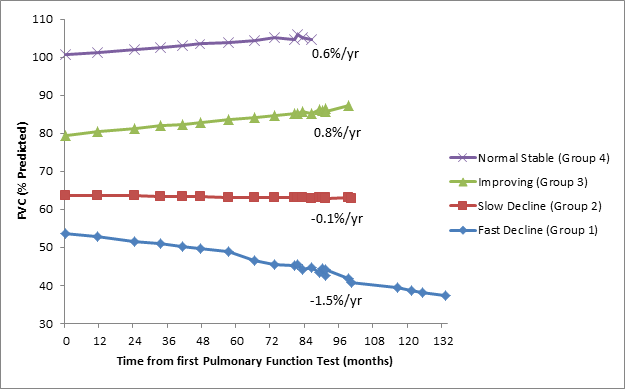Session Information
Session Type: Abstract Submissions (ACR)
Background/Purpose: Interstitial lung disease (ILD) is a leading cause of scleroderma (SSc) mortality, yet little is known about how changes in lung function over time varies among patients with SSc. We sought to identify trajectories of change in % predicted forced vital capacity (% pFVC) and their associated clinical variables in SSc patients over a 12-year period.
Methods: FVC values were obtained from serial pulmonary function tests performed as part of clinical care in SSc patients at Boston University Medical Center from January 2000-August 2012. SSc diagnoses were confirmed and clinical data obtained by chart review. Patients with ≥3 FVC values were included. We described the trajectories of % pFVC change over time using a group-based mixture model (SAS Proc Traj) that identifies relatively homogenous clusters of % pFVC change within a study population. Baseline demographic and clinical variables were examined for association with the identified trajectories of change using multivariable polytomous regression.
Results: In 253 SSc patients (1613 FVC values) we identified 4 trajectory groups of % pFVC change over time: fast decline (13%), slow decline (21%), improving (45%), and normal stable (21%) (Figure). Mean baseline % pFVC was lowest in the fast decline (56.5±16) and highest in the normal stable group (100±11.9). At baseline, the fast decline group had the highest proportion of males, African-Americans, patients with diffuse subtype, overlap features, anti-Scl70 positivity, ILD, pulmonary hypertension, myositis, and cyclophosphamide use. The normal stable group had the highest proportion of anti-centromere positive patients. In the multivariable model, younger age at baseline and at diagnosis, male sex, ILD and cyclophosphamide use were significantly associated with fast decline. Diffuse subtype was inversely associated with being in the normal stable group. Pulmonary hypertension was non-significantly associated with fast decline.
Conclusion: SSc patients receiving standard care in a tertiary care setting presented 4 distinct trajectories of %pFVC change, with approximately 1/3 of them experiencing % pFVC decline over time. As expected, low % pFVC and ILD at baseline were associated with fast decline. Younger age, younger age at diagnosis and male sex were also associated with fast decline and are factors not consistently noted in previous studies. The identification of distinct trajectories of lung function in SSc confirms what has been anecdotally observed and allowed us to estimate the proportions of such groups. Studying risk factors according to group-based modeling may have advantages over traditional methods and may be useful in future studies of biomarkers and other patient centered outcomes.
Figure: FVC Trajectories
Disclosure:
A. Man,
None;
T. Davidyock,
None;
L. Western,
None;
M. Ieong,
None;
Y. Zhang,
None;
R. W. Simms,
None.
« Back to 2013 ACR/ARHP Annual Meeting
ACR Meeting Abstracts - https://acrabstracts.org/abstract/identifying-trajectories-of-lung-function-change-over-time-in-scleroderma/

